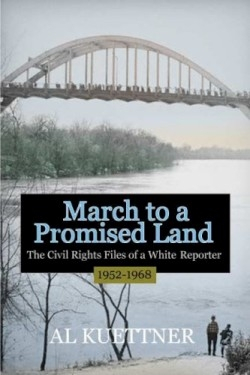March to a Promised Land
The Civil Rights Files of a White Reporter 1952-1968
“Now, it was forty years later [after the early 1960s civil rights battles in Alabama] and my memory was still forged like a slab of iron. I wondered was all the fighting worth it? The dogs and fire hoses? The tragedy of little children bombed to death in the Sixteenth Street Baptist Church?” In 2004, the author, longtime UPI correspondent and now ninety-one years old, retraces his reporter’s steps in search of the answer. Along the way he presents an illuminating yet brief history of the Civil Rights Movement: the strength of the book is that it places concisely in historical context the movement’s important events.
Kuettner was hired by the United Press wire service in 1942 (now UPI), and ten years later he was appointed the UPI’s national correspondent for the Civil Rights Movement, a position he held until 1978. He is the recipient of the Professional Journalism’s Fraternity Distinguished Service Award. His first civil rights assignment was the seminal 1954 Brown v. Board of Education case. Over the years, Kuettner logged hundreds of thousands of miles to report on the race beat. Early on, in Virginia, where some of the black schools were actually more modern and better equipped than the white ones, so that the façade of separate but equal could be maintained, Kuettner asked an elderly black man how could this be bad. He was told, “you white people won’t understand that it’s just not a nice building that counts.”
He showed that he did understand, as his sympathetic reporting earned him the respect of African Americans and gave him some important contacts along the way, including a young Martin Luther King, whom Kuettner met in 1955. They met during the Montgomery Bus Boycott, where Kuettner recognized King’s charisma and gained an appreciation of the pressures that King encountered from blacks and whites as the leader of the Civil Rights Movement. Kuettner includes overviews of the major protests he covered: Mississippi in 1962, Alabama in 1963, the murder of three civil rights workers and Medgar Evers in 1964, the Selma march in 1965, and King’s murder in 1968. In addition, he recounts the legislative battles over the Civil Rights Act and the Voting Rights Act, passed one year later in 1965.
The author claims to have set out to determine if the civil rights battles were “worth it.” However, the reader learns soon that Kuettner already knew the answer and if the reader has any doubts of his or her own they are dispelled by this affecting memoir.
Disclosure: This article is not an endorsement, but a review. The publisher of this book provided free copies of the book to have their book reviewed by a professional reviewer. No fee was paid by the publisher for this review. Foreword Reviews only recommends books that we love. Foreword Magazine, Inc. is disclosing this in accordance with the Federal Trade Commission’s 16 CFR, Part 255.

